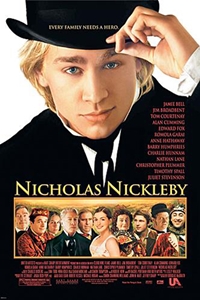Nicholas Nickleby (PG) ★★★
 Based on Charles Dickens' novel of the same name, Nicholas Nickleby follows a young man as he endeavors to reunite his family after his father's death leaves them at the mercy of their cruel uncle.
Based on Charles Dickens' novel of the same name, Nicholas Nickleby follows a young man as he endeavors to reunite his family after his father's death leaves them at the mercy of their cruel uncle.
Story
How To Write a Victorian Novel 101. First, introduce a perfect family like the Nicklebys, and place them in an idyllic country setting. Shortly thereafter, the father/provider must lose the family fortune and swiftly die of grief, leaving his family reliant on the charity of a cruel yet wealthy relative like Ralph Nickleby (Christopher Plummer), who should break up the happy family, sending the eldest son--in the case of Nicholas Nickleby, 19-year-old Nicholas (Charlie Hunnam)--to teach at a horrifying boys' school called Dotheboys, while forcing his mother (Stella Gonet) and his sister (Romola Garai) to live in the dark, miserable city of London. During this period of separation, the title character should prove himself an upstanding and honorable gentleman, rescue the unfortunate, show mercy to his enemies, fall in love, and attempt to reunite his family and avenge the wrongs done to them. If the story is a comedy, he will succeed and we will proceed--to the denouement, in which loose ends are tied up, a happy couple weds, and the cast takes its bows.
Acting
Victorian Drama 201. A rule of thumb: the villains and the minor players are always more interesting characters than the ingénues, and they will always receive the greatest ovation. Nicholas Nickleby is no exception to this rule. The soft-hearted good guys--Hunnam (Abandon) as Nicholas, newcomer Garai as his sister Kate, Anne Hathaway (The Princess Diaries) as Nicholas' love interest Madeline Bray, and Jamie Bell (Billy Elliot) as the broken child Smike, whom Nicholas rescues from the boys' school--humbly accept their plight, and it's enough to make you want to shake their genteel little shoulders to force them into action. Mercifully, Hunnam at least occasionally gets to fight back, exchanging some heated words and even coming to blows with his enemies, especially the utterly nasty Jim Broadbent (Iris) and Juliet Stevenson (Emma) as Mr. and Mrs. Squeers, who run the ghastly boys' school with finely honed cruelty. Even Plummer (Ararat, A Beautiful Mind), for all he's the big villain of the piece, doesn't come off as evilly as these two. There are also notable performances on the comedic side, particularly among the perfectly cast merry band of melodramatic theatrical players (Nathan Lane, Dame Edna Everage and Alan Cumming) that Nicholas and Smike join on their journey home.
Direction
Making Victorian Movies 301. With its fairy-tale look, fantastic sets and theatrical bent, Nickleby hearkens back to the flamboyant dramas of the Victorian period (think Oscar Wilde)--its opening credits, in fact, are displayed on the stage of a Victorian toy theater. But stories based on novels like Dickens' Nicholas Nickleby obviously take a lot longer to tell than plays--and in their time, they reached their audience in a different way. It often took weeks, even months, to read a full novel (or a serialized one) in Victorian Britain; families would gather 'round the fire for a few pages a night, savoring the story, making it last. Director/screenwriter Doug McGrath's (Emma) rendition of Nicholas Nickleby reconciles these two modes of entertainment admirably, allowing modern moviegoers a chance to revel in the assured pace of the twists and turns Dickens chose to place in the narrative's path, but abridging them in such a way as to make good theater. Despite the relative brevity of the narrative, however, McGrath doesn't rush us to the end; he seems to recognize that the best stories are all about the journey, not about the resolution.
Bottom Line
A faithful, if abbreviated, retelling of Charles Dickens' novel, Nicholas Nickleby doesn't bring much new to the period drama, but it's still a more compelling story than we ordinarily see at the movie theater these days.
To get the full Quicklook Films experience, uncheck "Enable on this Site" from Adblock Plus
box office top 10

Civil War Released: April 12, 2024 Cast: Kirsten Dunst, Wagner Moura 25.7M

Godzilla x Kong: The New Empire Released: March 29, 2024 Cast: Rebecca Hall, Brian Tyree Henry 15.5M

Ghostbusters: Frozen Empire Released: March 22, 2024 Cast: Paul Rudd, Carrie Coon 5.8M

Kung Fu Panda 4 Released: March 8, 2024 Cast: Jack Black, Viola Davis 5.5M

Dune: Part Two Released: March 1, 2024 Cast: Timothée Chalamet, Rebecca Ferguson 4.3M

Monkey Man Released: April 5, 2024 Cast: Dev Patel, Sikandar Kher 4.1M

The First Omen Released: April 5, 2024 Cast: Nell Tiger Free, Bill Nighy 3.8M

The Long Game Released: April 12, 2024 Cast: Dennis Quaid, Gillian Vigman 1.4M

Shrek 2 Released: May 19, 2004 Cast: Mike Myers, Eddie Murphy 1.4M

Sting Released: April 12, 2024 Cast: Alyla Browne, Ryan Corr 1.2M






